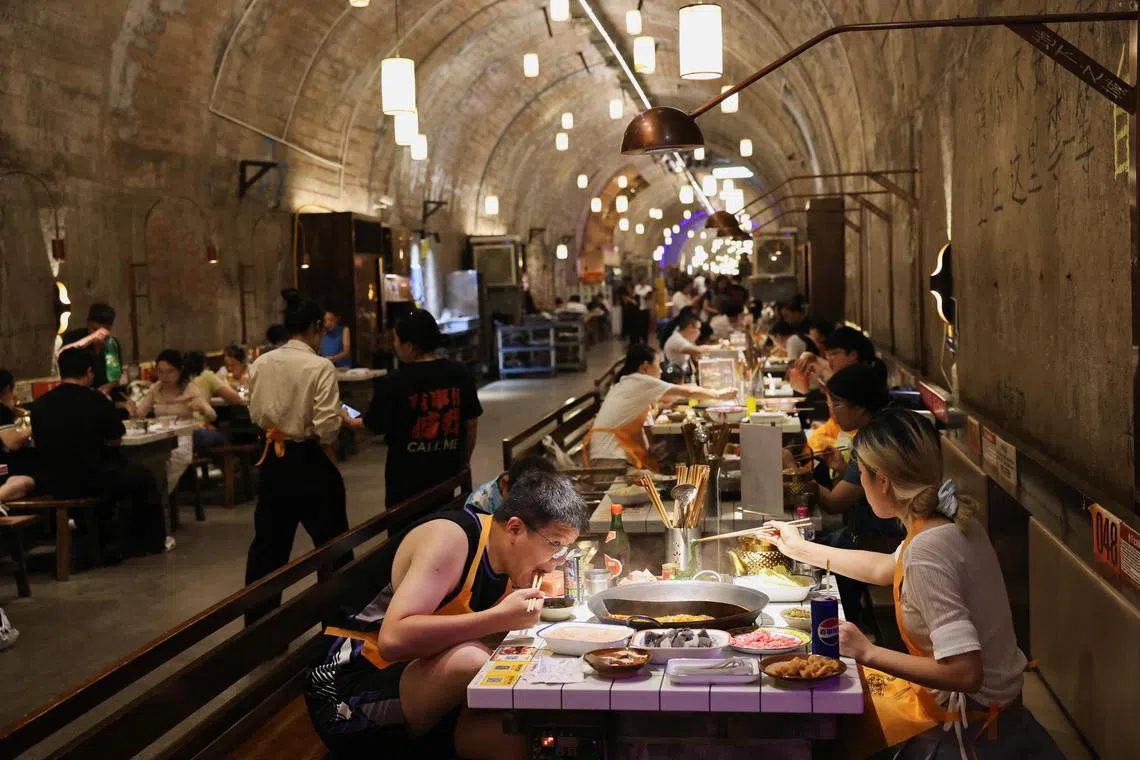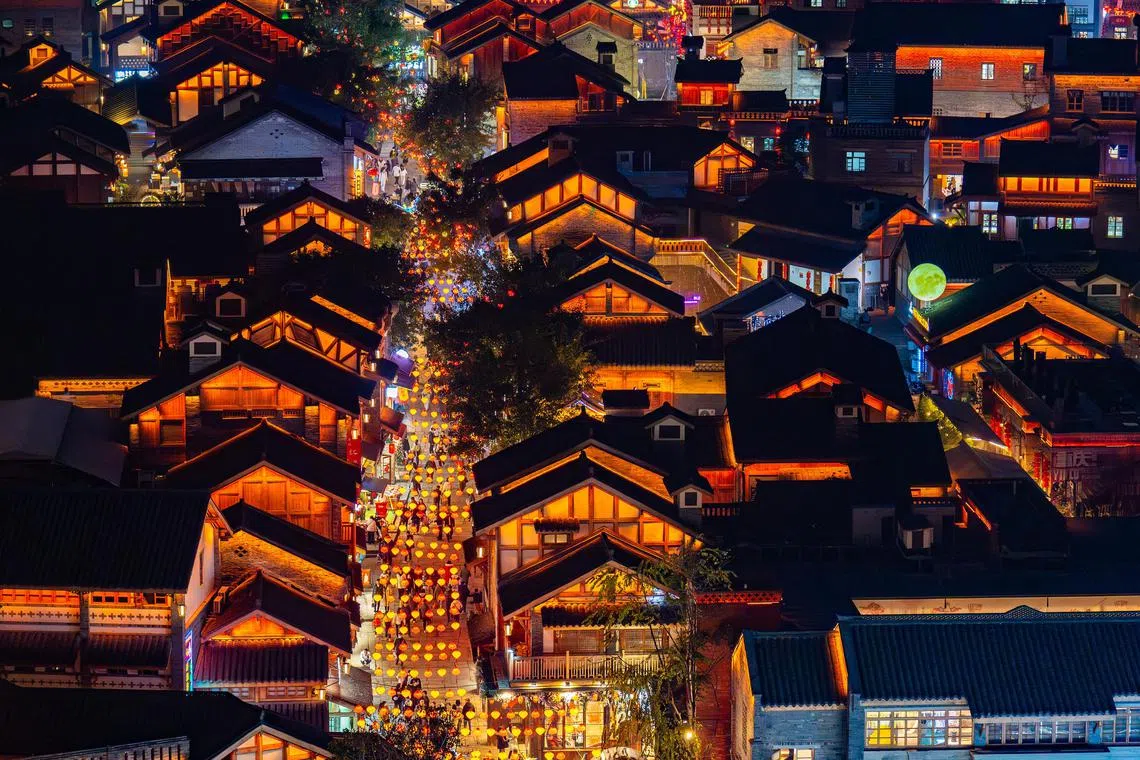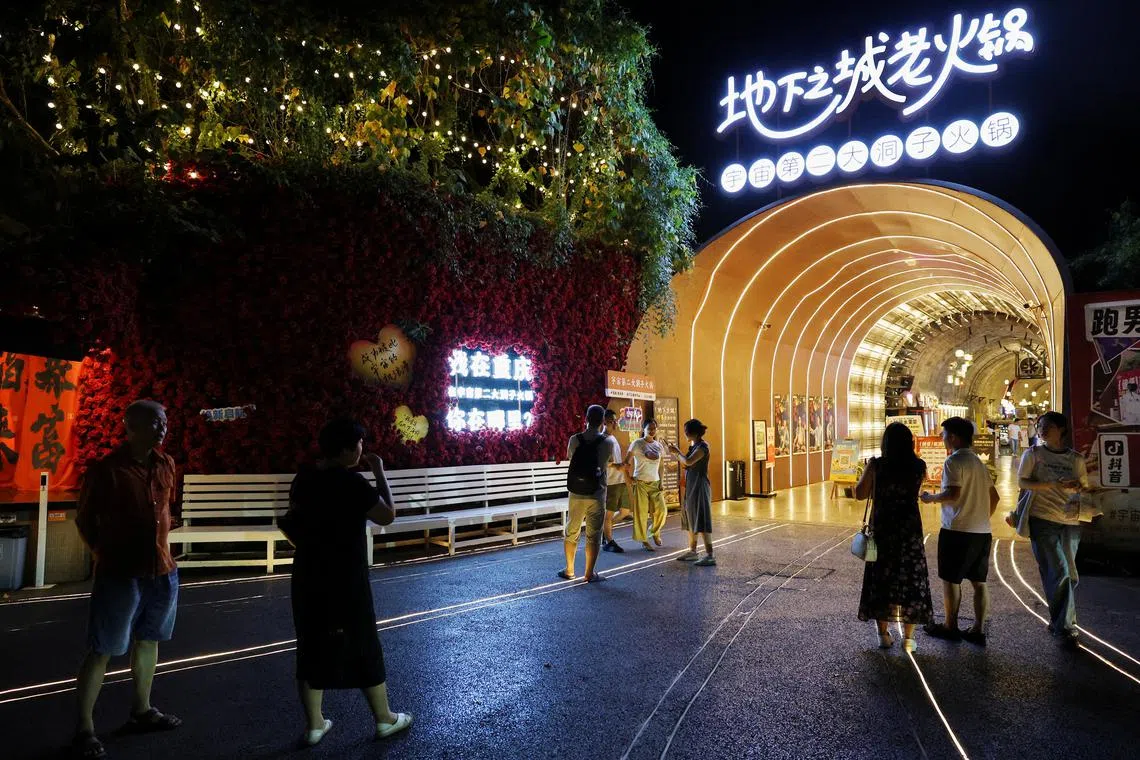China banks on hot summer nights to heat up spending
Sign up now: Get insights on Asia's fast-moving developments

Diners at Chongqing’s Underground Zhicheng Old Hot Pot restaurant, converted from a World War II-era air raid shelter, on July 31.
PHOTO: REUTERS
Follow topic:
- Chongqing promotes night-time economy with beer festivals and markets to boost spending during hot summer months.
- Residents enjoy nighttime activities like shopping and dancing, while businesses adapt with late hours and new offerings.
- Economic uncertainty and competition persist despite efforts; some residents remain cautious about spending.
AI generated
CHONGQING – As Chongqing swelters through its hottest month of the year, it is turning to its balmy nights to boost consumption.
Beer festivals, night markets and even watermelon-eating contests are being held around China’s largest city after sunset to encourage residents and tourists to loosen up – and loosen their purse strings too. Watermelons are a popular summer fruit in China that help with hydration amid the seasonal heat.
Chongqing resident Lu Meiqi, 27, who was shopping at 9pm on a weekday evening at Yangjiaping Pedestrian Street, told The Straits Times that she was “excited to step out of her home after being cooped up the entire day”.
“I don’t have air-conditioning at home so being out and enjoying the new night-time activities is actually quite comfortable. It is just too hot to go out in the day,” added Ms Lu, a shop assistant who was out on her day off.
Chongqing is one of China’s hottest cities,
Around Ms Lu, elderly people were warming up for their public square dances and clearing their throats for karaoke sessions – activities that typically take place in the day during the other seasons. Construction work, too, has been moved to after sunset.
Chinese policymakers want to encourage more people like Ms Lu to head out and hopefully spend money in a move to buffer the economy from sluggish growth and potential shocks from an ongoing trade war with the United States.
Cities around the country have pledged to grow their “night-time economy” – a term used to describe activities and spending that take place between 6pm and 6am.
A 2024 Commerce Ministry survey found that 60 per cent of China’s urban consumption takes place at night, with large malls earning the bulk of their daily revenue after 6pm.
“Summer presents a window of opportunity that the government will definitely seize to maximise retail spending,” said Mr Bo Zhengyuan, a partner at Plenum consultancy in Shanghai.
To this end, he noted, cities around China have been courting more domestic and international tourists this summer.
But he remains cautious about the broader outlook. “I don’t expect to see a major impact because the root problem of how incomes in China have not been rising is not being addressed,” Mr Bo said.
Economic uncertainty, driven by a slowdown in global growth and falling property prices, has left many Chinese feeling insecure about their job prospects and reluctant to commit to big-ticket purchases.
Official figures in July showed that retail sales – a gauge of consumption – grew 4.8 per cent in June,

Chongqing’s Shibati Traditional Style Area lit with lanterns and decorations ahead of the Chinese New Year in 2025. The city ranks as China’s No. 1 in terms of night-time economy.
PHOTO: AFP
Mr Ma Tangzhao, 48, who was out at 9.30pm on a supermarket run, told ST that he has been watching his spending, given how he expects “electricity bills to go up these few months due to air-conditioning”.
Mr Ma, who works in human resources, said: “Finances are a bit tighter this year because the company I am working for isn’t doing well.”
Still, the local authorities are pulling out the stops this summer to heed the central government’s call to boost domestic demand. And they are banking on the night-time economy.
Beijing, for instance, is in the midst of a three-year plan to boost its night economy with discount coupons redeemable only after 6pm, evening museum events and night walks through hutongs, the capital’s traditional alleys, for visitors to shop and observe local life.
For example, from July 16 to Aug 15, the National Museum for Natural History is holding light shows between 6pm and 9pm to show 4.6 billion years of Earth’s evolution as part of its “Night at the Museum” event. There are also puppet shows, games and educational programmes to draw visitors.
Other cities such as Guangzhou and Chengdu have launched evening river tours.
Shanghai, China’s financial hub, has put in place 10 support measures, including having more street stalls and night markets. Officials in Shanghai have also pushed for popular landmarks and shops to open until 2am.
Across Chinese cities, night markets featuring traditional Chinese medicine have become a new trend this year. Visitors can have their pulse taken and try treatments such as acupuncture, cupping, foot baths, massages and ear seeds.
The south-western city of Chongqing has fared well when it comes to the night-time economy.
Mr Zhang Yongwu, a municipal commerce official, said in July that Chongqing ranks as the country’s leading city for its night-time economy, citing polls by local media outlets.

A hot pot restaurant in Chongqing. Chongqing is said to rank as China’s leading city for its night-time economy.
PHOTO: REUTERS
For hotpot eatery owner Du Shi, opening till about 4am on summer nights is “business as usual for Chongqing”, given how hot the city can get.
“Even during the other seasons, we would stay open until 2am, 3am, because that is just part of our lifestyle here in Chongqing,” he said. “Hotpot, karaoke and supper are just our routine. Sometimes, I have customers coming in at 1am.”
Mr Du, 41, expects business to further improve in August as the weather gets hotter, just like the past two Augusts.
“For August, we have started selling roadside barbecue, on top of our usual hotpot fare, to encourage customers to have light bites, for those who may not feel so hungry due to the hotter weather.”
But he noticed that competition has become stiffer with more hotpot eateries popping up in his neighbourhood in Chongqing’s Jiangbei district.
“The overall economy isn’t doing very well, so people who are out of work or aren’t doing great at their jobs have come out to try and start businesses,” he said.


